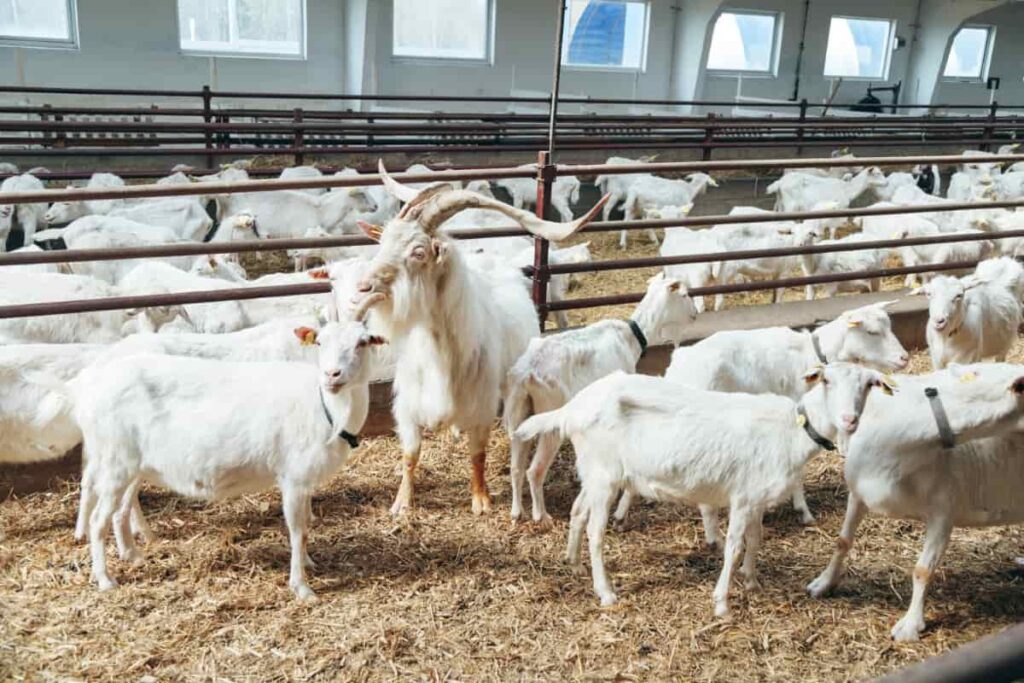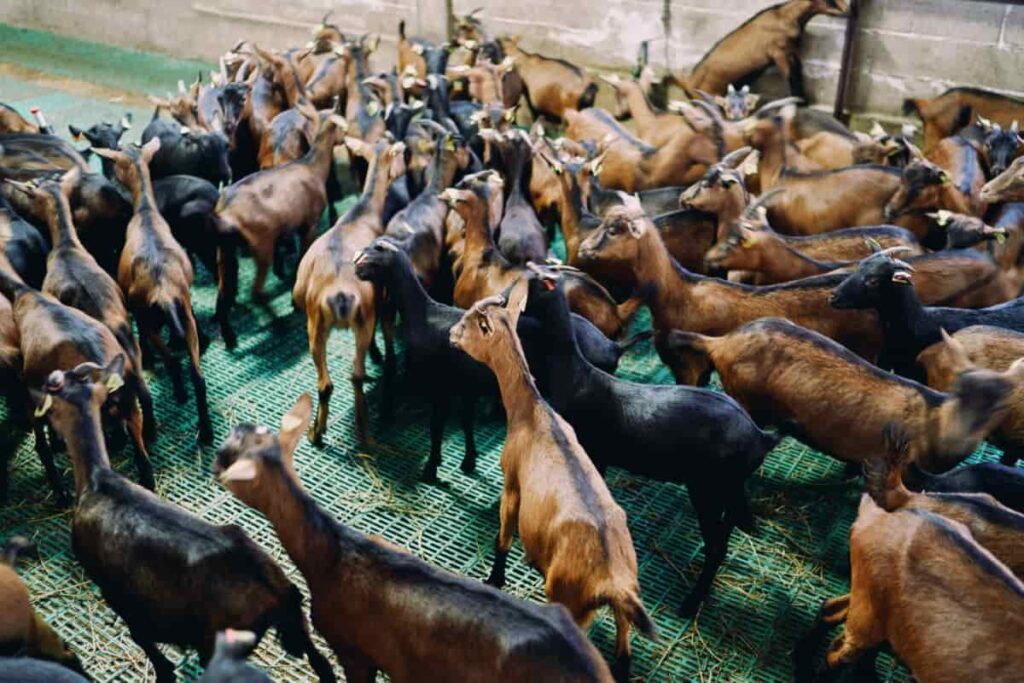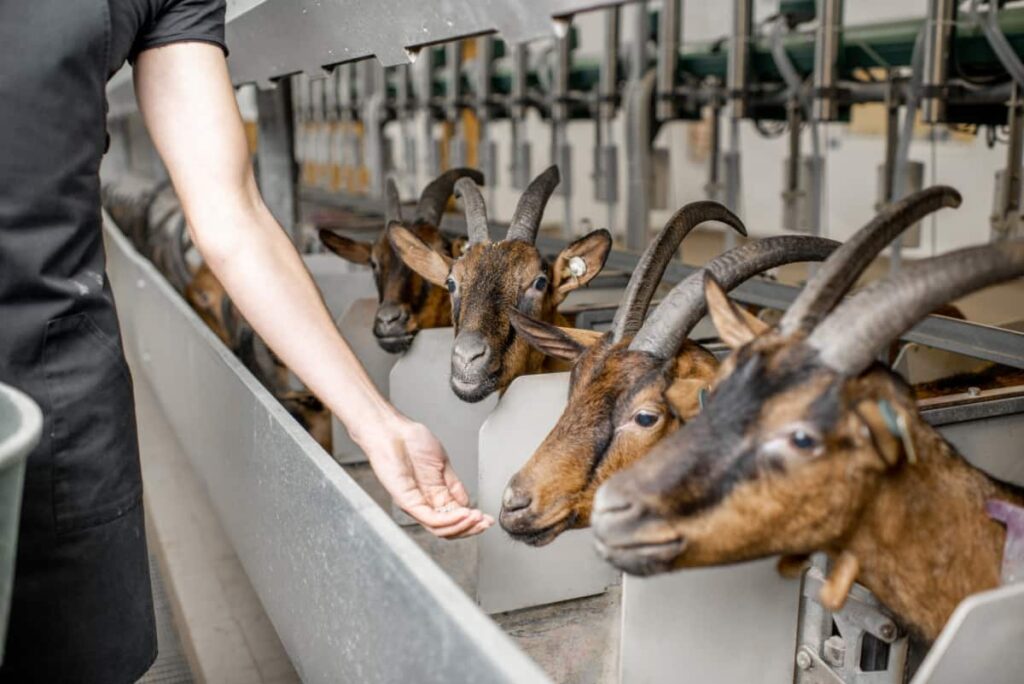AI also plays a crucial role in monitoring the health of goats and detecting diseases early on. Through intelligent algorithms, farmers can identify potential issues before they escalate, ensuring the well-being of their herds. With AI-driven technologies, farmers can enhance breeding programs by analyzing genetic data to make informed decisions and improve overall herd quality.

Enhancing Breeding Programs
AI technology allows for precise selection of breeding pairs based on genetic information, leading to healthier and more productive offspring. This results in stronger herds with desirable traits that are beneficial for both meat and dairy production. Furthermore, AI helps identify potential health issues early on, allowing farmers to take proactive measures to ensure the well-being of their animals. By optimizing breeding programs with AI tools, farmers can achieve profitability in their operations.
Monitoring Health and Disease Detection
AI technology enables continuous monitoring of vital signs and behavior patterns, allowing for early detection of any potential health issues. Farmers can proactively address concerns before they escalate into major problems. AI algorithms can identify specific disease symptoms based on patterns and trends in goat health data.
This proactive approach helps farmers take immediate action to prevent the spread of illnesses within their herd. Integrating AI into health monitoring and disease detection processes not only enhances the efficiency of goat farming operations but also ensures better outcomes for both the animals and the farm as a whole.
Feed Efficiency with Intelligent Algorithms
Intelligent algorithms take into account several aspects, such as age, weight, and health status of the goats, to tailor customized feeding plans. This not only improves overall productivity but also minimizes wastage and reduces operational costs. With real-time monitoring capabilities, these algorithms can adjust feeding regimes based on fluctuations in dietary requirements or environmental conditions. This level of precision ensures that each goat receives optimal nutrition for growth and performance.
Automating Milking Processes and Quality Analysis
With AI-driven milking systems in place, farmers can monitor milk quality in real time, ensuring that every drop meets high standards. The technology not only streamlines the milking process but also provides valuable insights into individual goat’s health and productivity. By automating milking processes, farmers can optimize their operations, saving both time and resources while maximizing output. Quality analysis is no longer a tedious task with AI at play – it’s quick, accurate, and reliable.
In case you missed it: Mastering Thuringian Goat: The Ultimate Guide for Beginners

Precision Goat Behavior Analysis
AI technology can monitor and track various aspects of goats’ behaviors, such as feeding patterns, movements, social interactions, and even signs of distress. This data is then processed to identify any anomalies or deviations from normal behavior that could indicate potential health issues or stress factors among the goats.
With this valuable information at hand, farmers can make informed decisions to improve overall herd management and welfare. Moreover, by understanding the behavioral patterns of individual goats within a herd, farmers can tailor their care strategies more effectively. This personalized approach enables them to address specific needs and ensure each goat receives proper attention and care.
Predicting Market Trends
This predictive capability allows farmers to make decisions on breeding, production levels, and pricing strategies. With the ability to anticipate market fluctuations, goat farmers can adapt their operations accordingly to meet consumer needs efficiently. By staying ahead of trends, they can maximize profitability and stay competitive in the industry. This market trend ensures that resources are used effectively while minimizing risks associated with unpredictable market changes.
Improving Genetic Selection with Genomic Data Analysis
By analyzing the genetic makeup of goats at a molecular level, farmers can make informed decisions about which goats to breed based on desirable traits. Genomic data analysis enables farmers to identify specific genes associated with traits like milk production and meat quality. This information allows for more precise breeding programs aimed at producing healthier and more productive goat herds.
In case you missed it: Comprehensive Guide to Carpathian Goats: Breeding, Care, and Products

By applying AI-driven genomic data analysis to their breeding practices, farmers can accelerate the process of genetic improvement in their herds. This not only leads to higher productivity but also helps in maintaining the overall health and well-being of the goats. By identifying desirable characteristics early on, breeders can improve breeding programs and enhance the overall quality of their herd.
AI-Driven Surveillance Systems for Enhanced Security
These intelligent systems use advanced algorithms to monitor and detect any unusual activity or potential threats, providing farmers with real-time alerts and notifications. Farmers can ensure round-the-clock surveillance of their goat herds and facilities, giving them peace of mind knowing that their assets are protected at all times.
Furthermore, these surveillance systems can also help in identifying patterns or trends in behavior that may indicate potential risks, allowing farmers to take preventive actions before any harm occurs. With AI-driven surveillance systems, goat farmers can enhance the overall security framework of their operations and safeguard their livelihood effectively.
Smart Environmental Control for Optimal Living Conditions
Goat farming can greatly benefit from implementing smart environmental control systems to ensure optimal living conditions for the animals. By utilizing AI-driven solutions, farmers can monitor and adjust factors such as temperature, humidity, ventilation, and lighting in real-time. Maintaining a comfortable environment is essential for the health and well-being of goats. Smart sensors can collect data on various environmental parameters and automatically make adjustments to create an ideal setting for the animals.
In case you missed it: Ultimate Guide to Kinder Goats: Raising, Breeding, Feeding, Care, Milk, and Meat Production

For example, during extreme weather conditions, smart systems can regulate temperature levels inside barns or sheds to prevent stress and discomfort among the goats. This not only improves their overall welfare but also enhances productivity and growth rates. By maintaining optimal living conditions, such as proper ventilation and ideal temperatures, the goats experience less stress and better overall health. This not only leads to higher productivity but also improves animal welfare standards on the farm.
Farm Management with AI-Integrated Software Solutions
With AI technology, tasks such as tracking feeding schedules, monitoring health parameters, and managing inventory can be automated for increased efficiency. AI-driven software can also help optimize resource allocation by analyzing data on crop yield predictions, weather forecasts, and market trends. The benefit of AI-driven farm management software is its ability to collect and analyze data from various sources.
This includes data on weather patterns, soil quality, and animal health. Furthermore, automation of milking processes and quality analysis using AI technology streamlines operations and improves efficiency. This not only saves time but also ensures consistent milk production levels. With AI, farmers can now optimize breeding programs for healthier and more productive goats.
- Types of Grass Growing for Goat Farm
- How to Train Goats for Milking: A Beginners Guide
- Goat Milking Practices and Equipment: A Beginner’s Guide
- Goat Farming for Fiber: Producing Mohair and Cashmere
- Maximizing Goat Milk Production: Tips for Dairy Goat Farmers
- Goat Farming as a Family Business: Strategies for Success
- Profitable Kenya Goat Breeds for Commercial Dairy and Meat Business
- Unlock the Secrets of Oberhasli Goat: Discover Raising and Management Practices
- Ultimate Guide to Myotonic Goats: Explore Profile to Raising